Made for Pack Flippers
If you ever flip the pack to check the back, you care about what you put into your body, and we do too.



High protein, savoury snack that'll fill you up without ruining your next meal. Clean ingredients, no preservatives, stops you eating junk.
A classic biltong recipe - thinly sliced strips of beef, seasoned with cumin, nutmeg and black pepper. No garlic or onions!
When you want a clean snack to satisfy your savoury cravings, you'll love our biltong. Just like slow cooking is better than zapping in a microwave, we slow air dry our beef which means it's naturally more tender and healthier than jerky. Free from all the nasty stuff you usually find in dried and cured meats, very low in sugar and taste the difference with organic, grass-fed and grass-finished Aussie beef. Being organic and grass-fed means our beef is free from things you might be trying to avoid like added hormones, pesticides and herbicides like glyphosate, mRNA and Bovaer feed.
Perfect pre or post exercise or simply as a clean, high protein, low carb treat that'll get you through to meal time without filling you up too much. They're also perfect to keep in the pantry to use with your weekly meal prep. Use them to add a high quality protein source to salads, pizza and more.

About Chief Biltong
Unlike most jerky, we naturally preserve our air dried steak (also known as biltong) just as our ancestors did - without nasty preservatives which destroy gut health. A lot of jerky is also surprisingly high in sugar, but not biltong, and it's slow dried which makes it much more tender than jerky. Better is an understatement.
Made for Pack Flippers
If you ever flip the pack to check the back, you care about what you put into your body, and we do too.

Avoid the hidden nasties in your meat snacks
You might be surprised by what’s really inside some of the “top-selling” meat snacks. Look closely and you'll find a cocktail of ultra-processed junk your body doesn’t need - and they're all things we leave out:
Often added to "sweeten the taste" – but it turns a protein-rich snack into a blood-sugar-spiking treat.
Linked to potential cancer risks, especially when used in processed meats. Banned in some countries.
Preservatives that extend shelf life but may disrupt gut health and contribute to inflammation. And not always disclosed on the label.
Used to boost flavour unnaturally. It's a processed additive that can cause headaches and other sensitivities in some people.
A flavour enhancer that's highly processed and can be a hidden source of MSG.
Sometimes used as a cheap protein filler – it’s ultra-processed, hard to digest, and often genetically modified.
Like canola or soybean oil used in marinades. These are industrial seed oils that are inflammatory and prone to oxidation.
Customer Reviews
It's basically like jerky, air dried strips of steak. Unlike jerky, biltong is generally more tender and easier to eat. We cut our biltong quite thinly so it's more like a nice prosciutto.
They're similar but jerky is usually cooked (~70°C) or smoked for several hours, whereas biltong is soaked in a salt-and-vinegar brine before being hung to slowly air-dry over a number of days. Drying is better for the nutrient profile of the beef because more heat sensitive vitamins, like Vitamin B12, are retained. Traditionally, biltong is made with a simple combination of salt, vinegar, and spices. Jerky, on the other hand, does not contain vinegar and is more likely to contain secondary ingredients like sugar, soy sauce, and Worcestershire sauce.
All our meat is organic, grass-fed, grass-finished, added hormone free, antibiotic free and ethically raised Aussie beef. Sourced directly from family owned farms following regenerative practices. Free from Bovaer and other feed additives as the cattle graze pasture their whole lives.
Our beef range is designed for those looking for a high quality protein source on the move, but they're also a brilliant post workout recovery snack and great for those who just want a guilt free, savoury snack. Suitable for the whole family.
Absolutely - that's when many women need more nutrition the most. Still, check with your healthcare provider first since they know your specific situation.
Some may warn you off dried meat during pregnancy because it's "not cooked" but there is nothing in our products that you would need to worry about while breastfeeding. They are very safe and in our personal experience we've found them to be great for pregnancy and breast feeding. In fact, high quality organic grass-fed beef is a fantastic supplement for mums who are growing human beings (and an important source of iron).
Yes! Our kids love the non chilli options which are perfect for kids and a great way to get some high quality protein into their diet. We have many customers tell us it's the only solid food they can get their kids to eat!
Still have questions?
Click the chat icon on the bottom right of the screen, or visit our support area.